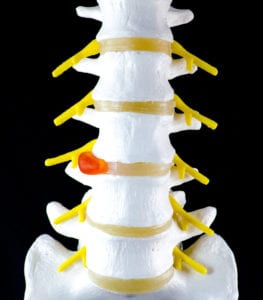 Pins and needles. Numbness. Weakness. Pain. These symptoms in your neck, shoulder(s), arm(s), wrist(s), hand(s), buttock(s), leg(s), or foot/feet could indicate a pinched nerve. The onset can be quick or progressive, over many years. Left to worsen, the pain could become chronic, even debilitating.
Pins and needles. Numbness. Weakness. Pain. These symptoms in your neck, shoulder(s), arm(s), wrist(s), hand(s), buttock(s), leg(s), or foot/feet could indicate a pinched nerve. The onset can be quick or progressive, over many years. Left to worsen, the pain could become chronic, even debilitating.
What is a pinched nerve?
Also called radiculopathy – by doctors, mostly – a pinched nerve occurs when a nerve is compressed. Some even call it “skinny jeans syndrome” because tight clothing that causes pressure on a nerve in the lumbar spine may trigger buttock, leg, and/or foot pain.
The good news is, for most people, a pinched nerve resolves itself over a few days or weeks.
Non-pharmaceutical treatment for a pinched nerve includes:
- Rest w/ or w/o Elevation
- Ice/Heat
- Splinting
- Physical Therapy w/ or w/o Massage
- Stretching Exercises (such as yoga)
- Repositioning (new chair, posturing changes)
- Weight Loss
If your pain worsens and home therapies are not effective, call Dr. Cody Doyle for chiropractic care with or without acupuncture. Depending upon your unique situation, the condition can worsen to cause bladder control issues, the “dropsies” (a tendency to drop items), a limb giving out (buckling knee, etc.), or difficulty constricting a muscle so that gripping becomes impossible. Permanent damage is possible if a pinched nerve does not resolve and is not treated.
Causes for a Pinched Nerve
Anyone can develop a pinched nerve. Bones, cartilage, tendons, muscles – all can put undue pressure on a nerve. Bone spurs, arthritis, a herniated disk, and many other factors contribute to pinched nerve pain.
Pregnant women may experience a pinched nerve that causes lower extremities pain, and the situation resolves after pregnancy.
Repetitive motions can lead to a pinched nerve, as is often the case with carpal tunnel syndrome.
Thyroid disease, diabetes, and prolonged inactivity increase the risk of experiencing a pinched nerve.
Chiropractic Therapy
Body parts that put pressure on a nerve, causing it to become pinched, can be joints, tight muscles, or a bulging or herniated disc in the spine.
At your visit, Dr. Doyle will first assess your pain and history, then create a treatment plan to adjust specific areas of your musculoskeletal system. By removing or repositioning bones and relieving muscle tension, pressure may be alleviated on a nerve. This, of course, will reduce or eliminate associated pain and other symptoms.
Depending on your case, Dr. Doyle may recommend combining chiropractic with acupuncture, which can relax spastic or tense muscles and stimulate blood flow, which will reduce inflammation. Improved blood flow also has restorative benefits. Working together, chiropractic and acupuncture are homeopathic therapies that have provided significant pain relief, in some cases. For chronic pain, periodic treatments work well.
Schedule Your Appointment
Don’t wait for a medical condition to worsen, and don’t continue to live in pain. Schedule your initial evaluation with Dr. Cody Doyle today. Our Roanoke, Tx chiropractic and acupuncture office treats patients from Trophy Club, Southlake, Keller, and surrounding communities.